|
As a nation, we celebrate Martin Luther King, Jr. Day on January 21st. Does this mean anything special for the Church—for Catholics, even? Catholics have much to learn and celebrate about the Baptist pastor, preacher, and prophet. The more we consider how far we have come as a nation and as a human race since Dr. King met his tragic end on April 4, 1968, the more we sense, I think, just how far we have to go to realize his Dream. When I think of Dr. King, I think of justice. Biblical justice. To recall a famous quote (King’s paraphrase from Theodore Parker), “The arc of the moral universe is long, but it bends toward justice.” As our nation honors Dr. King in a few days, I think it might be wise to contemplate for a moment the role of justice in our discipleship, which is an integral aspect of our baptismal identity as priest, prophet, and king. As a pastor and preacher, Martin Luther King, Jr. understood deep in his bones the kerygmatic nature (from “kerygma”) of true justice. Justice is a gift of Jesus. Like all gifts and graces from God, it is meant to be multiplied and shared. Even in the most difficult times of persecution, Dr. King proclaimed the gift of justice. In his famous “Letter From Birmingham Jail,” Dr. King wrote the words, “Injustice anywhere is a threat to justice everywhere.” Dr. King (who earned a Ph.D. in Philosophy from Boston University) quotes St. Thomas Aquinas in defining an unjust law as “a human law that is not rooted in eternal and natural law,” and then adds a simple explanation: “Any law that uplifts human personality is just. Any law that degrades human personality is unjust.” St. Thomas Aquinas (1225-1774), the great theologian of the Middle Ages and among the greatest in the history of the Church, defined justice as giving the other what is their due. Thomas Aquinas even defines “religion,” which is a virtue, as a form of justice, because it gives God the worship and adoration that is owed to him. First, can we ask ourselves where justice is still lacking in our world and in our own Church insofar as it is, alongside its spiritual identity, an institution composed of fallible, sinful human beings? Any lack of justice is a sure sign that we, the Church, have become adept in talking about the Gospel but have yet to take living it just as seriously. In her ongoing task of renewal, the Church must recover a robustly biblical, prophetic vision and conviction that justice is not accessory to the Gospel. Fortunately, in my own observations and ministry, I have seen that many young Christians are mending the gap that seems to have developed between “social justice Christians” and “liturgy and doctrine Christians.” This distinction is foreign to Aquinas and King, and the extent to which we buy into this split is the sign that we have allowed our faith to be compromised by the politics of the day. To offer one way of restoring this divide, in his letter Dr. King writes, “We are caught in an inescapable network of mutuality, tied in a single garment of destiny.” What if we thought about our baptismal garment, symbolic of putting on the life of Christ, as also the Church’s “garment of destiny”? Salvation and justice are the garment that clothes the body of Christ, the Church. One way of looking at Dr. King’s quote about the moral arc is to see it as a challenge that is not “way out there” in the universe, but as an invitation to bend and mend our personal lives toward justice. What might it imply to bend our lives? A change of habit or lifestyle, resisting our initial unkind or selfish response or natural inclination, and going out of our way to change the trajectory of our relationship with other people, our nation, and even creation. This is the message of “integral ecology” Pope Francis teaches in his encyclical letter Laudato Si. Dr. King saw God’s providential hand at work on a cosmic level, and as Catholics, we recognize the need as disciples to participate in God’s grace, and that includes justice. Authentic justice takes work, effort, struggle, and at times—as many true prophets in Scripture and history have experienced—persecution. Not all of us are called to create justice in the same way, yet we are all called to create justice in some way. Question for Reflection: What is one concrete step you can take to help create a more just situation in your family, school, workplace, or other sphere of influence today? To learn more about Catholic Social Teaching, please click here.
0 Comments
“Jesus allows himself to be found by those who seek him, but to find him we need to get up and go.” -Pope Francis I remember getting up in the middle of the night years ago to try and glimpse a rare, hybrid, solar eclipse. My husband and I camped out at the Lincoln Memorial in the wee hours of the night with blankets and hot chocolate to wait for a rising sun that would be covered by the moon. Rich pink and orange hues danced across the sky, basking the surrounding monuments. Though there were clouds that day, we knew something mysterious and magical was happening above us. We were willing to sacrifice some sleep and wait in the cold just to catch a glimpse of that star. What did the magi see when they looked up in the sky over two thousand years ago? It was enough not only to make them camp out in wonder, but to set out in haste. Their journey required provisions, logistics, time, and great effort. But something in the sky beckoned them. I imagine it was similar to what Peter, Andrew, James and John saw in the face of Christ calling them on the beach – something so extraordinary and captivating that it called them out of their day-to-day routines to begin a new journey. Both the journey of the magi and that of the first apostles had the same end: Jesus Christ. These journeys show that an encounter with Jesus is life-changing. It sets us in motion: the journey of the magi, the life of discipleship and evangelization. This past Sunday, the Christmas season continued with the celebration of the Feast of the Epiphany. The Gospel reading recounted the journey and visitation of the magi to the Christ-child. As the Catechism of the Catholic Church states, “The Epiphany is the manifestation of Jesus as Messiah of Israel, Son of God and Savior of the world. the great feast of Epiphany celebrates the adoration of Jesus by the wise men (magi) from the East, together with his baptism in the Jordan and the wedding feast at Cana in Galilee.” The birth of Christ is the first outward manifestation of the Messiah. Jesus, whose name means “God saves,” is the revelation of God’s plan of redemption. After years of prophecy and expectation, longing and promise, God comes in the midst of his people in the most intimate way possible: as one of them. This Incarnation is awe-inspiring. So awe-inspiring, in fact, that it even draws strangers. The Messiah foretold was long-awaited by the Chosen People of God—the Israelites. And yet, how many do we see at the birth of our Lord? The Visitation of the Magi foretells the inclusion of the entire world in God’s plan of salvation. He has come not only to redeem Jews, but Gentiles—peoples of every land and nation. As Paul wrote in Sunday’s second reading, “the Gentiles are coheirs, members of the same body, and copartners in the promise in Christ Jesus through the gospel.” What can we learn from the magi? In his homily on the Feast of the Epiphany last year, Pope Francis boiled it down to 3 things:
Let us imitate the magi in our lives of discipleship. They were not complacent, but so observant that they were able to recognize God’s sign: the star. “The Magi were not content with just getting by, with keeping afloat,” Pope Francis said last year. “They understood that to truly live, we need a lofty goal and we need to keep looking up.” They were vigilant, ready to go when the time came. And their hearts were receptive, disposed to the signs of the times. From there, they set out on a journey which would lead them to Christ himself. This journey required effort, planning, and sacrifice. And finally, they came bearing costly gifts: gold, frankincense, and myrrh. They met the generosity of God by reciprocating generosity. Pope Francis continued, “To give freely, for the Lord’s sake, without expecting anything in return: this is the sure sign that we have found Jesus.” As we reflect on the significance of the Feast of the Epiphany, let us look to the example of the magi in our lives of discipleship. Let us look up beyond the distractions of the world in order to see God’s star. Let us take the risk of setting out on our journey closer to Christ with joy. And let us give generously to a world which needs the generous love and mercy of the Christ-child. Question for Reflection: What are some things in our life that might distract us from seeing God in the everyday? Christian accompaniment is best understood through the Gospel story of the Road to Emmaus. If Emmaus is Heaven, each of us is on our own journey: afraid, confused, and attempting to make sense of the joy of the Resurrection. Each of us needs someone to walk beside, someone who will minister to us by simply listening, then understanding, and advising. On this journey, our earthly traveling companion is on one side and Jesus is on the other. The disciples couldn’t have come to understand the Paschal Mystery or their relationship with it until they let Christ be their guide.
As a precursor to the 2018 Synod, the Synod of Bishops released their working document, or Instrumentum Laboris, on Young People, the Faith, and Vocational Discernment. In its second part, the document discusses the necessity for vocational accompaniment, defined as “a process that is able to unleash freedom, as well as the capacity to give and to integrate the various dimensions of life within a horizon of meaning.” Though a rather lofty definition, it is clear that accompaniment centers around a proper understanding of discernment. Discernment can be a confusing Catholic buzzword. For some, the mere thought of it causes extreme panic, while others understand it as equivalent to “religious life.” I can’t count the number of conversations I’ve had where someone leans over to me and asks in a hushed tone, “Are you discerning?” to which I respond bluntly, “EVERYONE is discerning!” Every young person is constantly discerning not only our capitol “V” Vocation (such as a call to religious life, the priesthood, or to marriage), but also our vocation for every year, month, or moment of our lives. Each day is an opportunity to ask to know God’s will. Even a small daily prayer invites Him to let the Spirit work in our lives. With this definition of discernment in mind, accompaniment is the simple act of being present to someone, forming a relationship in order to walk with him or her towards an understanding of Christ’s will. The Synod’s Instrumentum Laboris says that there are many kinds of accompaniment. Whether it be formal spiritual direction, psychological accompaniment, advisement from a trusted elder, etc., accompaniment is necessary for the spiritual journey. We cannot live out our faith alone. We need others to share with, to learn from, and to pray with in order to grow as children of God. In my own journey, I have been blessed to be accompanied by many different disciples. My parents were the first to show me what it means to be accompanied in and through love. In high school, a few wonderful teachers gave me room to grow and begin to understand how Christ was speaking in my life. In college, I learned how to open myself to totally new companions and walk with college-aged ministers. In the most traditional sense, an excellent diocesan priest and longtime friend welcomed me in spiritual direction last year and together we learn how God is calling me to serve Him as I grow as a person and daughter. I know accompaniment is important because when I try to walk the road alone, I am met with a sense of isolation and confusion. When I made the decision to study abroad in Rome for the semester, I never realized the sort of impact it would have on my spiritual life. Leaving my closest companions, faith friends, and spiritual director behind in the United States, I felt unable to cope with the new challenges I’m facing. I’ve come to realize that without those spiritual relationships, the journey towards Christ becomes far more difficult. To accompany and to be accompanied are not positions to be taken lightly, and hopefully this Synod will show the Church how to better foster these sorts of relationships. In a time where many of us are feeling betrayed or isolated by the Church, it is difficult to trust that She is the source of these types of reliable and authentic relationships. As young people, however, we have to trust in the healing mercy of the Holy Spirit and the grace bestowed upon our Church’s shepherds. It is not an easy time to be a Catholic or a young person, but that is all the more reason for us to persevere on the journey with a companion on one side and Christ on the other. In Matthew’s gospel, chapter 16, Jesus asks his disciples, “Who do people say that the Son of Man is?” The disciples reply that some say John the Baptist, Elijah, Jeremiah, or another prophet. When Christ presses them further, “But who do you say that I am?” Simon Peter steps forward and answers, “You are the Christ, the Son of the living God.” Christ, responds:
“Blessed are you, Simon son of Jonah. For flesh and blood has not revealed this to you, by my heavenly Father. And so I say to you, you are Peter, and upon this rock I build my Church.” As Simon names Christ, Christ renames Simon. Simon’s recognition of Christ’s identity merits him a new identity, both by name, and by acceptance into God’s family. Simon, once son of Jonah, becomes Peter, child of God, disciple of Christ, the rock of the Church. Our Christianity—our proclamation that Jesus Christ is Lord—brings forth a new identity in all of us. The process first begins at baptism. On our behalf, our parents and godparents echo the sentiments of Peter through a profession of faith while the priest, describes our new identities through the words of the baptismal rite (emphases mine):
“You have become a new creation, and have clothed yourself in Christ. See in this white garment the outward sign of your Christian dignity. With your family and friends to help you by word and example, bring that dignity unstained into the everlasting life of heaven.” Not only does the baptismal garment symbolize the state of our souls, freed from original sin, but it also reflects on the nature of clothing as a sign of identity. A priest in his collar, an athlete in his uniform, a mother with a diaper bag slung over her shoulder - what we put on our bodies says something about who we are. During our baptism, we are clothed with Christ - the pure and spotless victim, symbolized by a pure and spotless garment. The white of our baptismal garments also represents the invitation of Christ to all people, regardless of race, ethnicity, social status, or gender. Despite the divisions we impose on one another through our many secondary identities, Christ makes no distinctions among the members of his Father’s house. As St. Paul says in his letter to the Galatians: “For all of you who were baptized into Christ have clothed yourselves with Christ. There is neither Jew nor Greek, there is neither slave nor free person, there is not male and female; for you are all one in Christ Jesus.” Our primary identity in Christ is universal and unified. So, what does our identity in Christ mean for us in the day to day? The baptismal rite covers that too. “With your family and friends to help you by word and example, bring that [Christian] dignity unstained into the everlasting life of heaven.” St. James puts it a slightly different way: “Be doers of the word and not hearers only, deluding yourselves. Religion that is pure and undefiled before God and the Father is this: to care for orphans and widows in their affliction and to keep oneself unstained by the world.” To the best of our abilities, as members of God’s family we must do two things: care and keep. Care: Be a doer of the word! Who needs your help? Ask God to show you who the orphans and widows are in your life, i.e., who needs you to provide something for them, whether it is material, emotional, or spiritual support. At some point, YOU will be a widow or orphan for someone else. When that time comes, ask God for the humility to accept help. Keep: Keep spotless your baptismal garment! Avoid the near occasion of sin, and when you don’t, repent and start over. Go to confession, receive the Eucharist, and spend as much time as you can in prayer. Grow close to Christ through your own sanctification. These directives from the baptismal rite and St. James depend on one another. The closer you are to Christ, the more you will serve his people. The more you serve his people, the closer you are to Christ. Notice that the baptismal rite specifies that you need the help of your “family and friends” to maintain your Christian dignity. You’re not in this alone. You have an entire community of believers behind you. Let’s be doers of the word together. The call to evangelize is at the heart of our Christian faith. We are evangelizers at our core; it makes up our very identity. And yet, if I were to ask most people sitting in the church pews at Mass if they are evangelists, they would probably shake their heads and identify themselves in other terms: vocation, occupation, role in the family, country of origin. A professor of mine in graduate school put it starkly when he said most of the laity are experiencing an “identity crisis.” We do not know, or have forgotten, who we are as members of the Body of Christ and what our role is within it. Today, Pope Francis echoes his predecessors in reminding the laity of their call to become missionary disciples. This is a call that originates from God Himself, with the Risen Christ saying to his beloved disciples before ascending to the Father, “Go and make disciples of all nations.” These words reverberate ever more powerfully for us today. Though the universal call to holiness and a greater emphasis on evangelization has roots in the papacy of Pope Paul VI and within the Second Vatican Council, Pope Francis calls the concept of sharing our encounter with Jesus Christ using the means available to us “missionary discipleship.” It is a profound concept that Pope Francis assures us is relatively simple. “The new evangelization calls for personal involvement on the part of each of the baptized,” he writes in Evangelii Gaudium. “Every Christian is challenged, here and now, to be actively engaged in evangelization; indeed, anyone who has truly experienced God’s saving love does not need much time or lengthy training to go out and proclaim that love.” Once we have encountered Jesus Christ and His merciful love, we are called to bring that encounter to others, therefore playing a unique role in salvation history. Several of my colleagues from the Catholic Apostolate Center and I were honored to discuss “The Call to Missionary Discipleship” at the Catechetical Day hosted by the Archdiocese of Washington in late October. We discussed that, as baptized Christians, we have been given the grace of Jesus Christ in order to respond to the both daunting and exhilarating call to “go out to all the nations.” This understanding of evangelization subsists not only on our personal encounter with God’s transforming love, but also on our proclamation of it. It is not enough to encounter Jesus Christ for ourselves. Like the woman at the well, we must go forth telling anyone who will listen, “Come see a man who told me everything I have done.” Below are five practical tips we came up with for living out the call to be a missionary disciple. What are we missing? Feel free to add to our list by commenting on our post below! 1. Collaboration If we are to be missionary disciples, we must be people of collaboration. This does not mean that we attend endless meetings, join committees, or fill every moment of our schedule. We propose collaboration from the beginning, which means a willingness to begin an endeavor communally with others—recognizing the valuable role each person has. Collaboration must happen among, for, and with those in our parishes and organizations. It requires openness to the promptings of the Holy Spirit, humility, dialogue, and flexibility. How can you learn from others in your community, parish, family, workplace, or neighborhood? How might God use the gifts and talents of a diverse group of people to strengthen His kingdom on earth? 2. Technology As followers of Jesus Christ, we are called to use the tools of this present age in order to re-present the Gospel to our world in a way that is innovative and re-invigorated. A major tool today that can be used to spread the Gospel message is technology, especially the internet. We can share digital content that is valuable, such as Scripture, the Catechism, and Papal and Conciliar documents, in order to become better informed about our faith. Technology can also create a new type of community, enabling us to connect with others and share information in a way that is cost-effective and not limited to physical proximity. What are some ways you can use technology to spread the Gospel and help build a civilization of love? 3. Community/Parish Life We do not exist in isolation. As Christians, our work of evangelization will not bear much fruit if we do it alone. Our community, especially our parish, strengthens us and equips us to go outside our church walls in order to evangelize. It is within the parish that we receive the sacraments, especially the Eucharist, which gives us the grace of Christ Himself. In order to be effective as missionary disciples, we are called to have a vibrant sacramental life strengthened by our communities. How does your parish community strengthen you for your mission of discipleship? 4. Relationships Relationships outside of the parish are also crucial to missionary discipleship. As mentioned above, we do not exist in isolation. Do we have a mentor or spiritual guide helping us to grow in our faith life? Do we have relationships or friendships that hold us accountable and push us to become better witnesses of faith? By developing faith-filled relationships and surrounding ourselves with mentors and guides, we ensure that we continue to grow in our role as missionary disciples. 5. Prayer Prayer is crucial not only to a life of missionary discipleship, but to the Christian life overall. Prayer is the foundation for our relationship with God, inviting us to get to know ourselves more deeply through his gaze of love and mercy and helping us to better understand our specific mission in building up the Body of Christ. Prayer can, and should be, both personal and communal. God speaks in the silence of our hearts, as well as through others. Are we carving out time in silence to converse with God and hear the promptings of the Holy Spirit? Do we read Scripture, pray the Rosary, journal, sing hymns, or reflect? By having an active prayer life, we will be better equipped to become fruitful missionary disciples. The call to missionary discipleship is both daunting and exciting, and we can live it out at any time. As Pope Francis wrote in Evangelii Gaudium, “Being a disciple means being constantly ready to bring the love of Jesus to others, and this can happen unexpectedly and in any place: on the street, in a city square, during work, on a journey.” Above, I’ve listed a few tips to fulfilling our call to become missionary disciples. What would you add to the list? Editor's note: This post was originally published in November 2017. Since its publication, the Catholic Apostolate Center has expanded its vision and resources for living as missionary disciples. Please see our "Living as Missionary Disciples" resources page and our 2017 e-book Living as Missionary Disciples: a Resource for Evangelization that was produced in collaboration with the USCCB. Lately, I have been reflecting on discipline as an important element of discipleship. What does the word discipline mean to you? Commitment, application, diligence, resolve, zeal, conscientiousness; these are all synonyms of the word discipline. Discipline and its synonyms imply a persistence, a willingness to do something difficult over and over in order to achieve a goal or to serve some purpose. Am I a dedicated disciple of Jesus Christ who is willing to discipline myself, physically and spiritually, body and soul, to be the best version of myself? Am I committed to using that self for the glory of Christ’s work on earth?
More often than not, the secular fitness industry attempts to convince people to be concerned with disciplining their bodies for aesthetic reasons. You should eat right, exercise, and get enough sleep so that your body conforms to a certain standard of beauty. The implication is that people who conform to this standard of beauty feel better about themselves, are admired more by other people and are more successful in life—but what if we cared about the health of our bodies because it was also bound up in the health of our souls? Scripture teaches us that the human body is made in the image of God, which the Catechism explains that “it is a human body precisely because it is animated by a spiritual soul” (CCC 364). This means that our bodies are not just our bodies: they are ensouled. That doesn’t mean that the body is just a container for the soul. Rather, “the unity of soul and body is so profound that one has to consider the soul to be the ‘form’ of the body: i.e., it is because of its spiritual soul that the body made of matter becomes a living, human body; spirit and matter, in man, are not two natures united, but rather their union forms a single nature” (my emphasis, CCC 365). The soul and the body are uniquely bound. The “form” of the soul organizes and determines the “matter” of the body—just as a collection of wooden planks can be organized by the form of “ship” or “house”. Thinking about all of this within the context of healthy living, understanding our human nature as the union of body and soul can help us to recognize the spiritual importance of caring for our material bodies. What if we took a walk, fueled our body with proper nutrition, or went to the gym because we knew that it would keep us more energized, focused, and alert to fulfilling God’s work on earth? The bodies that we have been given are a gift from God, and much like the rest of creation, it is our task to faithfully steward them. One way that we can live as faithful stewards of our bodies is to invite God into our daily choices. We can pray for the strength to take care of our bodies and when it feels like making a healthy choice is too difficult, we can offer up the sacrifice for someone else. The next time you are debating on whether to spend some time focusing on improving your bodily health, make the decision to offer the sacrifice of your time and energy for a specific intention. The intention can be for a family member, an acquaintance, a close friend, or perhaps a special intention that you are struggling with. “Offering it up” for another person is a form of “intercessory prayer,” which “leads us to pray as Jesus did” to God the father on behalf of others (CCC 2634). Offering the pain and suffering of bodily discomforts is a good way to continually remind yourself that your body is intimately connected to your spirit. Using your body for prayer is not a new idea in the Church. As Catholics, our worship and our sacraments are very sensorial. We cross ourselves, we kneel at the most important parts of Mass like the Consecration, and we use sacramentals like incense and holy water to orient ourselves in prayer to God. We should ask ourselves whether we are using our bodies properly during the spiritual activities of our week. Do we allow ourselves to be fully present and attentive at Mass by folding our hands in prayer and using our eyes to gaze upon the consecrated Body and Blood of Christ? When we genuflect or make the Sign of the Cross, do we muddle through the motions or do we execute each movement deliberately and with reverence? When we prepare ourselves for scriptural reflection or meditation, are we aware of the physical ways that we can help our bodies and brains to relax and focus so that we can bring all of our attention and faculties to Christ? Why should we be concerned with this idea of body AND soul? Our body and soul were designed as one; when we forget one for the other we are not living fully in service to our Lord. Let us use our bodies and souls in action and deed as one instrument for the Glory of God. Question for Reflection: How can I make my prayer more reverent by using my body? Who are they people in my life for whom I can offer up physical discomfort? Dear future volunteer,
Each time I revisit the Ascension stories in the Gospels, I find numerous points that relate to mission and service. Throughout my own time on mission in Jamaica, I see similarities between these verses and my challenges and blessings in a daily life of service. I hope to offer encouragement to you, future volunteer, as you research and discern the many opportunities for service available to you. “He rebuked them for their unbelief and hardness of heart…” (Mark 16:14) My strongest prompt to mission came as I reflected on a painting of St. Francis gazing at the cross and being told to rebuild the church. The question written with the painting asked, “Am I willing to do God’s will?” For many years, I have read, heard, and tried to practice in small ways, the example of Jesus doing the “will of my Father,” and loving others as God loves me. Now I felt that God had put the nudge toward mission into my heart. Two years of overseas mission service seemed like a very big step into the unknown but I had the stories of Francis and many others as examples, and I felt that if I said “Yes,” God would enable me to shed my worries and, thus, soften my heart and make more room for his Grace! Future volunteer, God will do the same for you. Mission has taught me to expect the unexpected and to trust in God’s plan. Though I was open to other ministries, there was a pretty high expectation at my future mission site that I would be helping in schools, and that is exactly where I found myself. My first classroom was noisy, chaotic, cramped, and undersupplied, but I found that I had the most difficulty countering the common teaching approaches, which I perceived as overly physical and sometimes belligerent. During the first days and weeks, it was very easy for me to get caught up in the prevalent practice of shouting, derision, and physically putting someone into their chair or the corner. I didn’t like myself doing that. Continually, readings in the Franciscan prayer book kept telling me that Peace IS the path. One time, a student told me that he didn’t like me putting him into his seat. The next day, I got down to his eye level and apologized to him. He listened, we hugged, and I felt that I was on my way toward a better practice. Future volunteer, are you ready to be stretched and molded according to God’s will? “The eleven disciples went to Galilee, to the mountain to which Jesus had ordered them.” (Matthew 28:16) I always notice the number eleven here; it is a particular mention to the fact that someone is missing. Dear future volunteer, are you worried about leaving your loved ones to do service? There are times when I am missing someone familiar from my table. It is different people at different times and my heart misses them. The last phrase—”to which Jesus had ordered them”—strikes me as being particularly relevant to mission and service. What are Jesus’ orders? Feed the hungry, clothe the naked, go and make disciples of all nations. Mission is an opportunity to do just that. My heart believes that God does and will take care of me while on mission, and the Almighty and Universal God is also able to care for my loved ones even when they are on a different continent! “He led them out to Bethany...They did him homage and then returned to Jerusalem with great joy and they were continually in the temple praising God.” (Luke 24:50-53) Dear future volunteer, as you discern your service, there is great help to be found in being “continually in the temple praising God.” I couldn’t have made my decision for mission without some serious prayer and reflection. The question of “Is this really God’s will?” was a focus for my Lenten prayer before I began my time of service. Contemplative silence and guidance from trusted friends helped me to find peace in the answer to that prayer. This ending of Luke’s Gospel account shows the disciples returning to the Temple, and I have reflected on how this seems to be the strength they needed before departing to their ministries that are recounted in Acts. “Jesus came and stood in their midst and said, ‘Peace be with you.’” (John 20:19; 21:22) Ahhh, my prayers were voiced and answered; my heart found peace, and my decision for mission was made. In John’s Gospel, Jesus breathes the Holy Spirit upon the disciples. In the next chapter, I see another of my tendencies: my desire to get a quick summation of God’s plan. Peter wants to know about the future for the Beloved disciple…(nudge, nudge, wink, wink) and he is gently reminded by Jesus, “What concern is it of yours? You follow me.” The disciples encounter the resurrected Jesus in their everyday lives while fishing, walking, eating, and interacting with others. As my mission time unfolds, I also see Jesus in everyday life. I see him in the faith voiced in the locals that I meet and in new forms of singing and praise. I feel discouragement at the discrepancy of incomes and lack of faith just as Jesus felt while gazing at Jerusalem. I marvel to see God’s hand in creation as I walk by household gardens or explore the hills. And, like the disciples, I see Jesus working through me, giving me a stronger dependence on prayer as I realize that I will not be able to fix systemic problems, and a stronger sense of humility as I realize that I am an outsider here, but I truly have been sent by God. Jesus ascended and asked his disciples to go and teach all nations. Mission service makes us a viable part of that eternal and mystical plan. Jesus may have disappeared into the clouds, but we are able to make his presence real today. I really think that He was having a good chuckle as He ascended. He knew how much mission would change us! Dear future volunteer, are you ready to be changed? To learn more about service opportunities through Franciscan Mission Service, please click here. This reflection was originally published on the Catholic Volunteer Network Blog and was posted with permission. Janice Smullen is a recently returned missioner with Franciscan Mission Service. She most recently served in Kingston, Jamaica. A second wind is often an unexpected gift. Whether it is discovered during a run, study session, or some other activity demanding intense focus and effort, what at first seems daunting and impossible to achieve suddenly becomes possible thanks to newfound strength and endurance. A second wind, while surely appreciated physically or mentally, can also be applied spiritually. As the Church celebrates her birthday on Pentecost Sunday, we can reflect on the incredible gift of the Holy Spirit who was sent by God Himself to provide the fledgling Christian faith a much needed second wind as apostles prepared to bring the Good News of Christ to the entire world.
One of the Gospel readings for Pentecost details our Lord’s promise to send the Holy Spirit to His disciples. In an earlier related chapter from John’s gospel, Christ Himself walks with the disciples and predicts His own Passion. He assures the disciples that they will not be abandoned as orphans, but will share in the very life of the Most Holy Trinity (John 14:15-31)! The consolation and comfort Jesus brought to those gathered in the Upper Room after His death and resurrection surely reminded them of this though He ordered them to not leave Jerusalem until “the promise of the Father” had been sent (John 20:19-23). It would not be until after Christ’s ascension, that the Holy Spirit would be sent upon the disciples and so enable them to carry out the Great Commission of our Lord, “Go therefore and make disciples of all nations, baptizing them in the name of the Father and of the Son and of the Holy Spirit, and teaching them to obey everything that I have commanded you.” While Christ had sent out the disciples to evangelize before (see Luke 10:1-20, cf. Matthew 10), these efforts were limited to “the lost sheep of the house of Israel.” Proselytizing the rest of the world would take place after the rejection of our Lord and would require grace to sustain the disciples through this incredible evangelical endeavor. Today, the faithful are not only entrusted with this mission, but have also been baptized and confirmed with the same Holy Spirit as was promised to Christ’s first followers! The Holy Spirit is truly God and is inseparable from the Father and the Son. Though Christ is seen, it is the Spirit who reveals Him. Thus, both are on a “joint mission” to reveal the visible image of the invisible God (see CCC 689). The Holy Spirit invites us to better know the Father and Son. Each person of the Trinity more fully deepens our understanding of God. As the Catechism says: Now God’s Spirit, who reveals God, makes known to us Christ, his Word, his living Utterance, but the Spirit does not speak of himself. The Spirit who “has spoken through the prophets” makes us hear the Father’s Word, but we do not hear the Spirit himself. We know him only in the movement by which he reveals the Word to us and disposes us to welcome him in faith. The Spirit of truth who “unveils” Christ to us “will not speak on his own.” (CCC 687) The Holy Spirit continuously reveals Christ to us when we make an effort to listen. Similarly, when we recognize and cooperate with the Holy Spirit dwelling within us, we are better able to contemplate Christ’s teachings and the great Mysteries of Faith. When we face discouragement or are unsure of a decision we must make, we are in similar circumstances to those waiting in the Upper Room. The gifts of the Holy Spirit strengthen our faith and helps us to judge our situations prudently. The courage to continue Christ’s mission and not be defeated by discouragement or rejection is not only an incredible witness to the Church, but also a recognition that the Holy Spirit continues to work among us wherever we are in our journey of faith! Just as the Holy Spirit descended upon our Lord at His baptism to start His mission on earth, so too did Christ send the Holy Spirit upon the disciples in the Upper Room as they began their ministry. Like the disciples, let us dare to be open to the Holy Spirit’s activity in our daily lives as a much needed second wind as we continue our Lord’s work so that at the end of our days, we may hear spoken to us, “Well done, my good and faithful servant ... Come, share your master’s joy.” Question for Reflection: Can you recall a moment when the Holy Spirit gave you the courage to continue through a difficult trial? This Sunday's reading from Luke is from one of my favorite passages in the Gospel. We pick up with the two disciples who just encountered Jesus on the road to Emmaus. Whatever business these disciples had out in the countryside, they abandoned their plans after their encounter with Jesus and ran back to Jerusalem to share what had happened. The Gospel says that “While they were still speaking about this, he stood in their midst and said to them, ‘Peace be with you.’” Based on how abruptly Jesus appears to the rest of the disciples, we can imagine that they were incredulous at what Cleopas and his companion were telling them. As with “Doubting Thomas,” it seems that the other disciples also needed to see in order to believe.
It’s interesting to compare the encounter on the road to Emmaus to the interaction that takes place here. When the two disciples met Jesus on the road to Emmaus, they had no idea it was him. He walked with them, developed a rapport with them, and only then did he challenge their worldview and lack of faith in the promises of God. He gently rebuked them, opened up the Scriptures to them, and then broke bread with them. And it wasn’t until that moment that they truly understood who Jesus was and how he fulfilled the Scriptures: “Were not our hearts burning within us while he spoke to us on the way and opened the scriptures to us?” Jesus was patient, meeting them where they were and letting them understand God’s work at their own pace. When Jesus appears to the rest of the disciples, he seems to appear out of nowhere. They all panic and think he’s a ghost until he proves his physical presence to them: he shows them his wounds and even eats something right in front of them. It seems he has the intent of driving the point home, opening their minds to understand the Scriptures. This time, it’s without rebuke, without judgment or frustration. He instead gives the disciples something to look ahead to: “You are witnesses of these things… I am sending the promise of my Father.” He doesn’t just explain the past, but also hints at what’s to come! I love this passage because it speaks loudly to our tendency to not really take matters of faith to heart. And it’s so easy to do. Even for a person of faith, the Passion, death, and Resurrection of Christ can seem completely outrageous! We can be slow to understand God’s plan and actions in the world and in our lives, especially when they are different from our own. Even saints like Mother Teresa experienced doubt at times. But we can take heart in knowing that, when these times of doubt come up, Jesus will make himself known to us in some way, much like he did on the road to Emmaus and in his appearance to the disciples in Jerusalem. He may not be as explicit as we’d expect; it can come through a word from a friend, a kind gesture from a stranger, or even our own actions toward others. God uses all the experiences and encounters in our lives to invite us to encounter him, too. Just like on the way to Emmaus, he walks with us, befriends us, and shows us the truth. Sometimes when we are slow to understand, he acts more directly and obviously in our lives, as he did with the disciples in Jerusalem. As we continue this joyful season of Easter, let us always listen to those times our hearts are burning within us. It is then that God speaks to us most clearly, if only we pay attention to Him. Question for Reflection: How is God walking with you this Easter season? It’s Holy Saturday. Jesus is dead; a boulder is in front of the tomb, and it is sealed. He is gone. So now what? What next? On Holy Saturday, my thoughts are with the apostles. Although Jesus foretold of his death, I’m not sure that they actually believed him or that they imagined it would consist of the sacrifice on the Cross. But Holy Saturday is when the reality hits them. Just imagine the millions of questions that they must have had. I imagine that they were similar to the ones above. “Now what? What next?” Imagining the disciples left with these unsolved questions, I start to realize that I too have had some questions when the going got tough or when I faced challenges, like on a recent mission trip. A few weeks ago, I had the privilege of accompanying 18 students from The Catholic University of America and two other staff members to the island nation of Jamaica for an alternative spring break cultural immersion trip. While in Jamaica, we visited several sites run by organizations like the Missionaries of Charity, the Missionaries of the Poor, and the St. Patrick’s Foundation. The most impactful day for me was the one I spent at Bethlehem House. Bethlehem House is a home for children with severe mental and physical disabilities. Of the eighty children who live there, only about twenty receive the occasional visit from their families. The rest of the children likely never see their families again. Most of them will also never be able to live on their own without significant medical assistance. The missionary in charge of the home asked if I would work with the older children, telling me that these children get the fewest visitors either by family members or by outside groups. “They need your love more than anyone else here,” he told me as he dropped me off in the room. It was just me, a caretaker (who only spoke Patois, a native language of Jamaica that is a mix of Scots and Creole) and the children. For the first hour, I didn’t know what to do. I was dumbfounded, heartbroken, and depressed by their situation. I could barely even crack a smile, let alone laugh. I didn’t understand the joy that others had talked about working with this group of children. I was aimlessly walking around the room, wondering, “What next?”. As one hour turned into two, one of the children woke up from a nap. He shouted from across the room “Hey! Hey you!” I looked at him and he said, “Come here and pick me up!” Still dumbfounded, I walked over to his crib and picked him up. He quickly told me that his name was Ashanti. Ashanti was one of the few children who was able to have a full conversation. He had such severe scoliosis that he was paralyzed from the waist down and had a lump in his back. Ashanti also had an enlarged, misshapen head. After about five minutes of walking around and talking with me, he grabbed my beard and declared that I was his best friend. He smiled and let out the most infectious laugh I have ever heard! In that moment, I knew that I was not looking just at Ashanti’s face, but at the very face of Jesus laughing and expressing joy. I learned more about love in those five minutes then I had learned in years. The rest of my day at Bethlehem House was full of joy, even in the midst of such extraordinarily difficult circumstances. In reflecting about that day, I think about the apostles on Holy Saturday who had locked themselves away in the Upper Room, unsure of what was next. They wondered and waited. But Easter did come, and their joy returned. The face of Jesus did appear again, just as it had for me in my experience with Ashanti. After Easter and with that joy, the apostles went out into the world proclaiming the Gospel. We too are called to encounter Christ in the joy of Easter and spread the Gospel message. More often than not, our days are like Holy Saturday. We experience days when all seems lost and hope seems foolish. But we must resist that temptation, resist the idea that hope will not return, that joy is lost forever. We know that Easter is coming and will always come. Joy will have its triumph. And it can be shared and experienced by all those we encounter. So on this Holy Saturday, let us be like the apostles and go out into this world after experiencing the joy that awaits us on Easter Sunday! For more Lenten and Easter resources, please click here. This Lenten season, I’m trying to be intentional with my prayer. In the Gospel today, Jesus teaches the disciples to pray the Our Father. When I read this passage to my students, they were really excited to make the connection to Jesus’ teaching and to a prayer some of them had heard before. Their little faces lit up and hands shot into the air to share about their experience with the Our Father.
In a 2016 homily, Pope Francis explained that the concept of “Father” in the Our Father is the cornerstone of prayer, for it gives us our identity as sons and daughters of God and as a family. Prayer is a way to connect with God, talk to him, and deepen our relationship with him. In prayer, Pope Francis said that if we do not begin “with ‘Father’ and with the awareness that we are children and that we have a Father who loves us and knows all of our needs,” we can sometimes find ourselves in our most vulnerable place: alone. It can be hard to be open and listen for God’s voice in the midst of worrying about ourselves and our concerns. This Lent, I invite you to use prayer to help deepen your understanding of your identity as the son or daughter of God and to put aside distractions and focus on Christ. In prayer, we can discover a deeper sense of self and of others. We can also take a moment to consider our failures and better understand God’s forgiveness. In the Our Father, we ask God to forgive us and pray that we can find strength to forgive others. That strength can be found in the Sacrament of Reconciliation and in making amends to those whom we have wronged. This deepens our relationship with God and with others. Pope Francis continued, “If you go to pray and say only ‘Father’, thinking of the One who gave you life, who gives you your identity and loves you, and you say ‘our’, forgiving everyone, forgetting offences: this is the best prayer that you can make”. Throughout Lent, I want to deepen my prayer life and model for my students and my husband that God is truly at the center of my life. During Lent, I’d like to challenge myself to sit in the chapel some mornings before school starts and pray in silence before God. I’d also like to plan my morning around a daily Mass. Throughout Lent, I will look to the Our Father as a centering and reflective prayer. Jesus taught us to pray with it, and I intend to use these simple but transformative words to guide my life. Just as my students continue to learn about prayer, I too will continue to allow myself a chance to start over and prepare my heart for God’s love this Lent. As we continue on our Lenten journey, I invite you to reflect on the following questions asked by Pope Francis in his homily: “Do I see God as Father, do I feel that He is my Father? And if I do not feel that He is, do I ask the Holy Spirit to teach me to know this? Am I capable of forgetting offences, of forgiving, of letting things go and asking the Father: ‘they are also your children, and they treated me badly, please help me to forgive?” For more Lenten and Easter resources, please click here. During college, I had a professor with a reputation for being extremely challenging. Upperclassman students would warn us as freshman: “whatever you do, don’t take him! You will work more in his class than you ever have before!” I vividly recall one chilly, December afternoon walking by this professor’s office and watching students storm out from it, visibly angry. “Not good,” I thought to myself. It would certainly be easier to continue to breeze by in my classes than to be challenged. My senior year, against all advice, I decided to enroll in this professor’s class. The warnings from the upperclassmen were correct. He was difficult and challenged me to grow in my craft like no educator before had ever challenged me. And for that, I am forever thankful. How can you grow without being challenged? I am only the professional I am today because my professor was dissatisfied with the status-quo. He knew his curriculum would be difficult, but he believed that each of his students could achieve more, even though it was uncomfortable and challenging. He wanted us to excel rather than simply get by. As I reflect on Pope Francis’ upcoming 81st birthday and give thanks to God for his ministry, I see some similarities between him and my professor. One of our Holy Father’s greatest gifts to the people of God is that he challenges us to be uncomfortable with the status-quo, with “maintenance mode.” In Evangelii Gaudium, Pope Francis exclaims: “In our day Jesus’ command to ‘go and make disciples’ echoes in the changing scenarios and ever new challenges to the Church’s mission of evangelization, and all of us are called to take part in this new missionary ‘going forth’. Each Christian and every community must discern the path that the Lord points out, but all of us are asked to obey his call to go forth from our own comfort zone in order to reach all the ‘peripheries’ in need of the light of the Gospel.” Pope Francis, much like my professor in college, presents us with a challenge because he knows that the Church’s potential is incredible, even if this shift to mission mode is not easy. Convincing our colleagues and community to move from maintenance mode to mission mode, however, can be difficult. Some parish leaders I have encountered argue that their parish has always done something in a certain way and that if they changed it half of their parishioners would leave the parish. Nevertheless, in Evangelii Gaudium, Pope Francis reminds us that: “Pastoral ministry in a missionary key seeks to abandon the complacent attitude that says: ‘We have always done it this way’” (EG, no. 33). The only way that parishes will become missionary communities that are focused on going forth to form missionary disciples is by shedding their contentedness with the status-quo and aversion to conflict at all costs. Pope Francis continues, “the word of God constantly shows us how God challenges those who believe in him ‘to go forth.’” Let us then turn to God and his Word in order to have the courage to go forth! Moving from maintenance to mission will be uncomfortable, but, as Pope Francis prophetically reminds us, is our calling as followers of Jesus Christ. Please join me and the Catholic Apostolate Center team in wishing Pope Francis a very happy and blessed 81st birthday, which he will celebrate on December 17th! For more resources on Missionary Discipleship, please click here. When I was in 8th grade, I helped teach for my parish’s religious education program and counted the hours toward my required community service time before receiving the Sacrament of Confirmation. I was an assistant for the 5th grade, and I thought it was the coolest thing. I could share with the class what I knew about the Church, even teaching them at one point how to pray the Rosary. Looking back, it seems like I was destined to teach in a Catholic school! After college, I began working at my current school in the Archdiocese of Washington (ADW), where I continue to teach and share my faith with the students. To this day, I continue to teach religion. I strive to form my students as disciples according to six elements of Catholic life: Knowledge of the Faith, Liturgy and Sacraments, Morality, Prayer, Education for Living in Christian Community, and Evangelization and Apostolic Life.
For catechists who actively pass on the Word of God to others, teaching the faith can become almost second nature. For instance, at my school, we incorporate core Jesuit principles into the curriculum each day and reflect on our own actions through prayer. In my pre-K classroom, we use these principles to talk about kindness and loving others as St. Ignatius taught. In a special way, my students are learning how to be good friends and love others the way Jesus did. In the Archdiocese of Washington (ADW), the religious curriculum has standards by which its content is measured and assessed—like any other subject area in school. In fact, ADW is trying to support catechists to do more to collaborate and keep kids engaged and excited about learning their faith. Professional development of catechists is crucial to a school, parish, or community. Learning how to be better witnesses of the faith ensures that our children are receiving the best formation of conscience they can get. Although there are people certified and educated to teach as catechists, most of us are already fulfilling that duty as faith-filled adults in the Church who witness to and spread the Gospel. Below is a list I have compiled of a description of a catechist. After reading it, do you feel called to become one?
For more information, we invite you to view the following webinar at the bottom of the page:
Question for Reflection: How can you teach the faith to others in your everyday life? "I will give them a new heart, and put a new spirit within them." -Ezekiel 11:19 I hold my son Leo closely, rocking him back and forth in the quiet of the night. He throws his head back, pushes against me, and babbles to keep himself awake. As his mother, I must be patient and persistent. The fruit of my efforts results in his deep breathing, dangling arms, and heavy eyelids. Leo is now ten months old—crawling, pulling himself up, climbing. While he still looks to me for assurance and affirmation, he much prefers exploration to stillness. Not wanting to miss a thing about this big world, he wrestles with me as I put him down for naps and at bedtime. I often think as I sing to Leo and soothe him to sleep: This is how I am with God. I wrestle with him, pushing back, filling my life with distraction. I prefer my will—my way—to his own. I forget to rest in his stillness. In my graduate program, a professor once shared a particularly beautiful insight that still strikes me today. He said that if two human beings rest long enough on each other’s chests, their hearts sync up and beat in rhythm with one another. As a mother, this insight is especially poignant and beautiful to me—I think of my son’s heart slowing down and mine speeding up to embrace and beat as one. Then I apply this truth to God: have I allowed myself to rest in him? Do our hearts beat as one? The Gospels tell us that John, the Beloved Disciple, reclined on the chest (kolpos in Greek) of Christ at the Last Supper. Applying my professor’s insight to the Gospel, we can gather from this image that John’s heart beat in time with Christ’s, whose own heart beat perfectly with his Heavenly Father’s. As Christians, we are all called and invited to become the Beloved Disciple. This is not a privilege for a select few. Resting on the kolpos of Christ and allowing our hearts to beat in time with his gives our lives true meaning and fulfillment. As Pope Francis said, “The Heart of the Good Shepherd tells us that his love is limitless; it is never exhausted and it never gives up. There we see his infinite and boundless self-giving; there we find the source of that faithful and meek love which sets free and makes others free; there we constantly discover anew that Jesus loves us even to the end’ (Jn 13:1), without ever being imposing.” This intimacy with God, however, does not happen overnight. The Gospel does not say that John rested on the chest of Christ right after Jesus called him to discipleship on the Sea of Galilee. This intimacy was the fruit of years spent in the presence of Jesus. It is the fruit of a deep relationship with him—sitting at his feet, sharing meals, listening to his preaching, witnessing his miracles. We do not rest on the chest of a stranger. We are called, therefore, to grow in intimacy with God by opening our hearts to his. As the Catechism of the Catholic Church states, “It is the heart that prays. If our heart is far from God, the words of prayer are in vain.” Though Christ opens his heart to all of his children, we are called to build that intimacy with him, as John did, through prayer, stillness, the sacraments, and service. The famous quote of St. Augustine reminds us that our hearts are restless until they rest in God. And so we will not feel satisfied in this world until we have allowed ourselves to rest in the heart, on the kolpos, of Christ. “God’s heart calls to our hearts, “ Pope Benedict XVI observed in his homily on the Solemnity of the Sacred Heart of Jesus. When we allow ourselves to rest in the heart of Christ, he invites us “to come out of ourselves, to forsake our human certainties, to trust in him and, by following his example, to make ourselves a gift of unbounded love.” Our encounter with the heart of the Good Shepherd, therefore, is what strengthens us to go out in our respective vocations and live as missionary disciples. May we rest on the kolpos of Christ and experience his perfect charity so that we may become “gifts of unbounded love” to the world. As we deepen our intimacy with God, let us look to John’s childlike trust and ask for his intercession in order to become who we were created to be: beloved disciples. Questions for Reflection: Do certain things keep you from growing in your relationship with Christ? How might God be calling you to rest in him? For resources on prayer, please click here. In 1964, the Second Vatican Council affirmed in the document Lumen Gentium, “that all the faithful of Christ of whatever rank or status, are called to the fullness of the Christian life and to the perfection of charity.” The Catholic Apostolate Center continues to promote this truth in the 21st century by providing active Catholics the tools and resources to share Christ’s loving message of salvation. In this way, the Center’s mission focuses on reviving faith, rekindling charity, and forming apostles who give witness to this fullness of the Christian life by embracing their baptismal call. Father Frank S. Donio, S.A.C., Director of the Center, explains, “The Catholic Apostolate Center is rooted in the spirituality of St. Vincent Pallotti, who believed that all are called to be apostles and to be co-responsible for the mission of Christ and his Church.” Founded in 2011 as a ministry of the Society of the Catholic Apostolate (Pallottines),Immaculate Conception Province, the Catholic Apostolate Center develops resources that the faithful, particularly those in ministry, can use to aid in their own evangelization efforts. The Center responds to the current needs of the Church through developing, in collaboration with dioceses and other institutions and organizations, formation programs for the New Evangelization. It assists pastoral leaders in deepening collaboration with one another and provides formation opportunities for members and collaborators of the Union of Catholic Apostolate. The Center accomplishes this bold mission through online resource pages, webinars, podcasts, and blogs, as well as through the partnerships with organizations like the United States Conference of Catholic Bishops (USCCB), the Archdiocese of Washington, Catholic Volunteer Network, and St. Joseph’s College of Maine, among others. Furthermore, they host seminars, webinars, and presentations as well as providing consulting services. “While we do produce our own material, and have a large amount of no-cost digital resources, the Center collaborates with many national and international Catholic organizations, dioceses, and the USCCB on a variety of projects to assist active Catholics in living as missionary disciples,” Donio said. In the spirit of St. Vincent Pallotti, the Center equips Catholics to “go out” empowered with the resources and knowledge to propagate the faith for the New Evangelization. St. Vincent Pallotti founded the Union of Catholic Apostolate, an association to revive faith and rekindle charity among Catholics and propagate the faith to all. St. Vincent Pallotti encouraged collaboration among the clergy, religious, and the laity in the 1800s at time in history when many thought the work of the Church should be left to priests and religious. The Catholic Apostolate Center looks to the life of St. Vincent Pallotti for inspiration as it strives to form collaborative relationships with more organizations, further develop its formation resources, and ultimately, empower all the faithful - clergy and lay - to live out their baptismal call. The Catholic Apostolate Center specifically entrusts its work of forming apostles to Mary, “Queen of Apostles” because of her invaluable role in building the early church and encouraging the first apostles. The Center looks to the Blessed Mother as the perfect model of discipleship, apostolic work, and charity as we strive to lead Christ’s followers closer to her Son. Formation leads to action - this is a core belief that influences the work of the Center. Throughout his papacy, Pope Francis has reminded us to be comprised of both action and word, to encourage a spirit of accompaniment and encounter. “Go out,” he says. “Go out and share your testimony, go out and interact with your brothers, go out and share, go out and ask.” By forming the laity to “go out,” the Catholic Apostolate Center hopes to empower the Body of Christ to collaboratively carry out the mission entrusted to the Church by Jesus Christ. This article was originally published at CruxNow.com and can be viewed here. Kate Fowler is the Blog Editor for the Catholic Apostolate Center.
Chris Pierno is the Advancement and Marketing Manager for the Catholic Apostolate Center. |
Details
Archives
April 2024
Categories
All
|
About |
Media |
© COPYRIGHT 2024 | ALL RIGHTS RESERVED

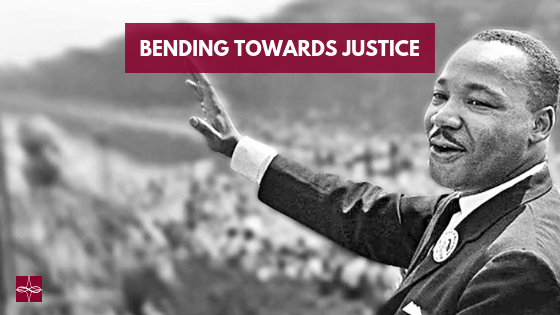

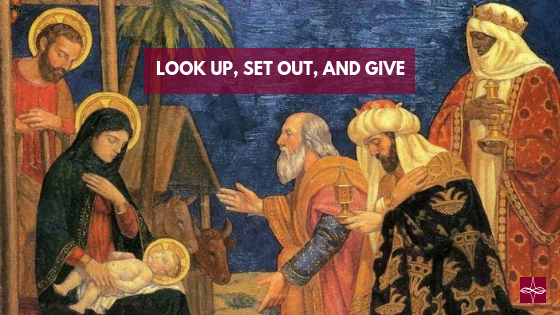



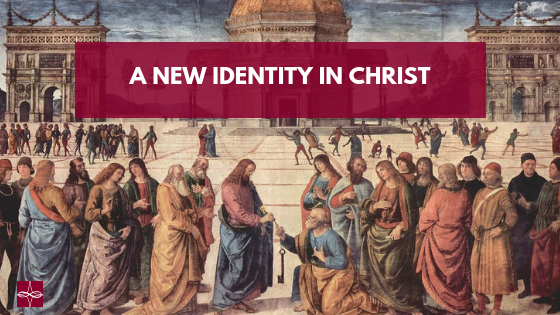



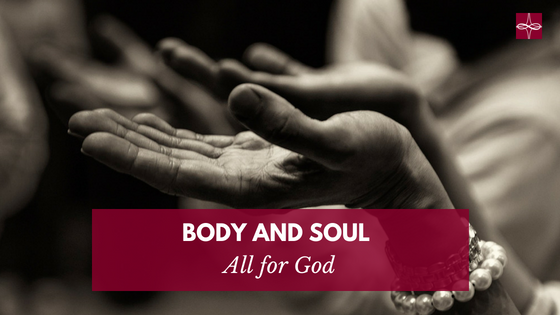

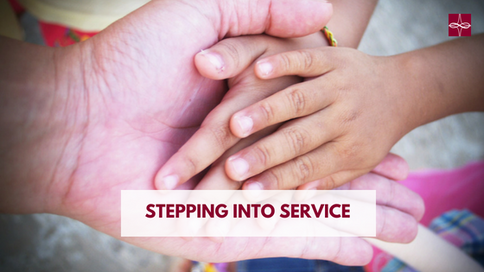
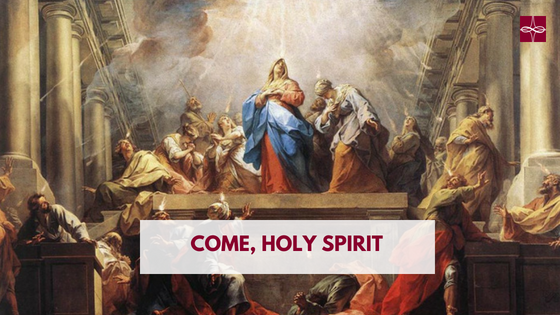

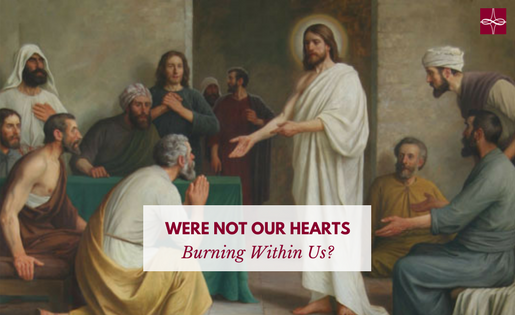

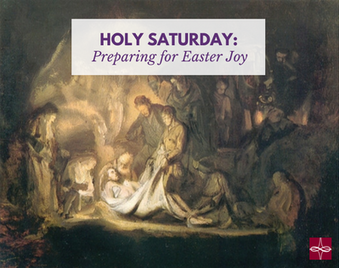



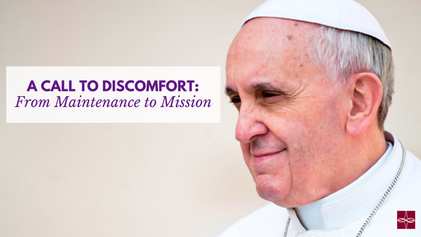

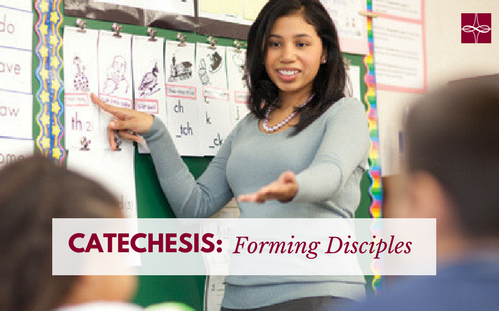

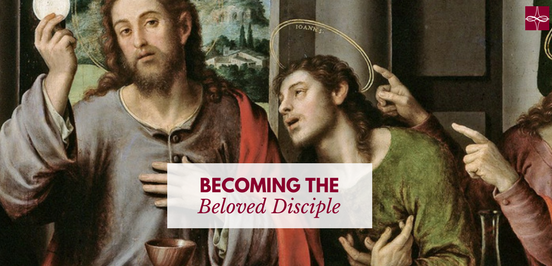

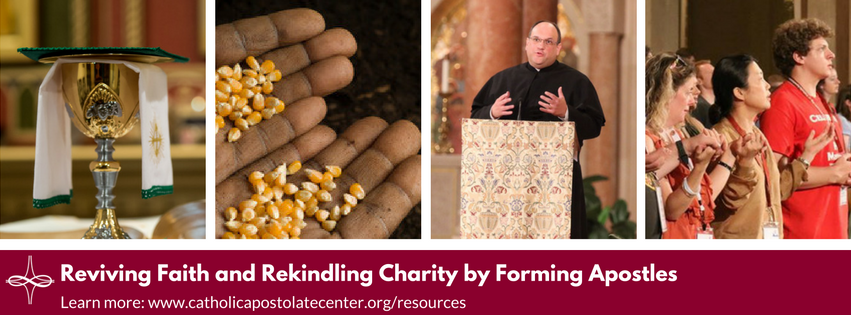
 RSS Feed
RSS Feed